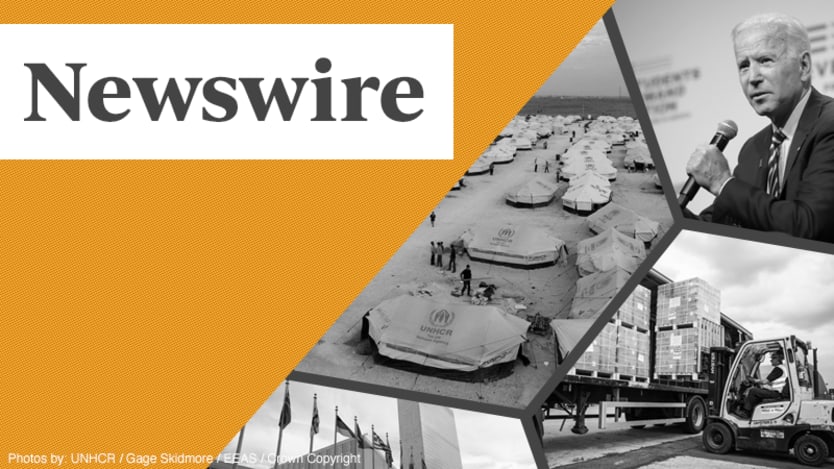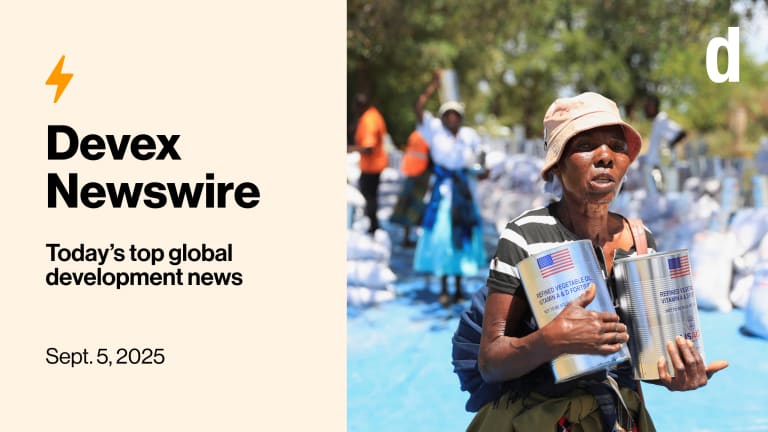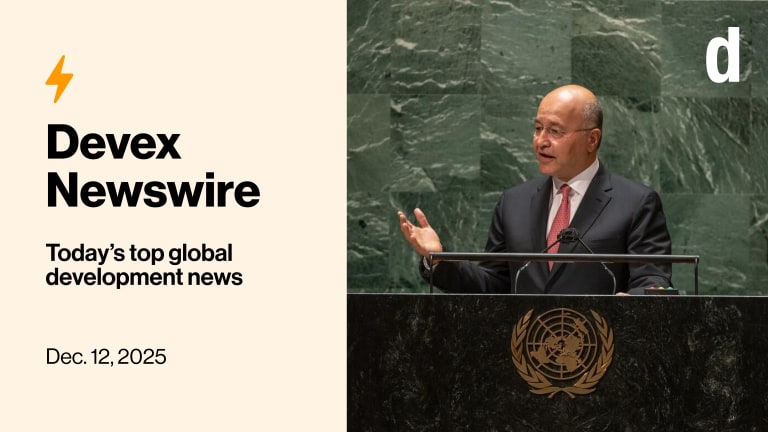
Global development donors aren’t always forthcoming when it comes to transparent disclosures of what they are funding and where. The Aid Transparency Index has sought to change that by collecting granular data on more than a million programs run by almost 1,500 major funders and fostering some healthy competition among them. But now the index has lost its primary funder — and its own future is suddenly anything but clear.
In today’s edition: We’ve also got key takeaways from the U.S. House foreign aid budget bill, and new funding from the Gates Foundation for malaria and NTDs.
This is a preview of Newswire
Sign up to this newsletter for an inside look at the biggest stories in global development, in your inbox daily.
The Aid Transparency Index is produced every two years by Publish What You Fund, a U.K. nonprofit, which assesses data submitted to the International Aid Transparency Initiative by the world’s major aid agencies.
For the last decade, the index’s largest funder has been the William and Flora Hewlett Foundation. However, my colleague David Ainsworth reports that the foundation is now ending its support, with plans to shift its focus to supporting governments to adopt and implement global standards.
That is bad news for transparency advocates who say that after years of investment and improvement, the index has become a valuable tool for researchers — and one that compels donors to produce better information.
“Given the decade of effort and tens of millions of dollars invested in the systems and processes that have enabled the creation of this dataset, it’s unthinkable that we could be facing a catastrophic decline in data quality for want of a mechanism that costs a fraction of that,” says Gary Forster, CEO at Publish What You Fund.
The question, David reports, is who might step in to save it?
Read: Aid Transparency Index at risk of closure
Gateway crasher
My colleague Vince Chadwick has spent a hectic few days at European Development Days in Brussels, and Devex Pro subscribers can read his reporting on what he saw — and on the progress of the “Global Gateway.” Many are waiting to see if the European Commission’s project is, as Vince puts it: “a Belt-and-Road-rivaling gamechanger, or just preexisting money and ‘heroic assumptions.’”
Read: What is the EU's ‘Global Gateway’ anyway? (Pro)
+ Pro subscribers can also read about how Brussels sees its development budget as a major asset as it strives to become a geopolitical power player. Not gone Pro yet? Start your 15-day free trial.
On your marks
The U.S. House of Representatives' latest budget bill for foreign aid and other international programs is 294 pages long. Good news: my colleague Adva Saldinger’s roundup of the most significant takeaways from the bill — which comes at the beginning of a very long appropriations process — is much shorter.
The House bill allocates $64.6 billion for foreign affairs spending in fiscal year 2023 — a 15% increase from the previous year. But, as Adva notes, if last year’s process was any indication of where things are headed, the final number that emerges from the bruising budget process is likely to be smaller.
The bill also includes some notable policy changes, including provisions to roll back the Helms amendment and the Mexico City policy, which bar U.S. support for abortion and organizations that provide them.
Read: US House budget bill includes 15% increase for foreign affairs
The vax of life
A modeling study published Thursday in The Lancet had good news and bad news. First, the good news: COVID-19 vaccines prevented an estimated 19.8 million deaths in their first year of rollout, in research that spanned 185 countries and territories where at least one death due to COVID-19 was reported. That included 4.2 million averted deaths in India and 1.9 million in the U.S. — the two countries that saw the largest estimated impact.
The bad news is just 1% of those averted deaths were in low-income countries, where an estimated additional 200,000 deaths could have been prevented if the countries had been able to reach the World Health Organization’s goal of 40% vaccination by the end of last year. To date, just 17.8% of people in low-income countries have gotten a dose of vaccine, even as WHO’s hoped-for deadline to vaccinate 70% of every population looms at the end of this month.
Study: COVID vaccines averted 19.8M deaths, but fewer than 1% in LIC
ICYMI: Some LICs make COVID-19 vaccination progress, but far from 70% target
Cereal killer
Global food security is on the agenda as foreign, agriculture, and development ministers from the Group of Seven major industrial nations gather in Berlin on Friday for a ministerial conference.
“Ministers will discuss how to get Ukrainian grain, which is currently trapped in silos, out of the country, according to Ramin Toloui, the U.S. assistant secretary of state for economic and business affairs. Speaking to reporters, he said the U.S. supports efforts by the United Nations to negotiate the opening of Ukrainian ports to allow for grain exports, adding that it is coordinating with the international body and Ukrainian government,” Teresa Welsh writes.
Read: G-7 ministers to gather for global food security conference in Berlin
+ Learn about how agriculture, nutrition, sustainability, and more intersect to remake the global food system by signing up for Devex Dish — our free, must-read Wednesday newsletter.
Time to regroup
“It's very important to get the next malaria vaccine studied in populations in high-endemic regions, particularly in Africa, as soon as possible.”
— Trevor Mundel, president of global health, Bill & Melinda Gates FoundationSpeaking ahead of the Kigali Summit on Malaria and Neglected Tropical Diseases, Mundel tells my colleague Sara Jerving that the world is off track when it comes to disease reduction targets. With big funding decisions ahead and new prevention and treatment tools on the horizon, it’s a critical time to recommit.
Gates Foundation: Time to regroup on malaria and NTDs
On Thursday, the Gates Foundation backed up Mundel’s message with new funding.
Melinda French Gates announced $140 million over the next four years to “African institutions and leaders that accelerate progress toward ending malaria and neglected tropical diseases,” as well as to those working to help the continent recover from the COVID-19 pandemic.
Read: Gates Foundation pledges $140M to fight malaria in Africa
+ Join us in person in Washington, D.C. or online July 12 for Devex World, where we'll feature an exclusive interview with Bill Gates on how to prevent the next pandemic.
In other news
At the Commonwealth summit, Canadian Prime Minister Justin Trudeau pledged an additional 250 million Canadian dollars ($192.6 million) to the U.N. to address the global food crisis exacerbated by the war in Ukraine. [Reuters]
UNICEF needs $1.2 billion to help some 8 million children at risk of life-threatening malnutrition in 15 countries. [UN News]
As quake-hit Afghanistan appeals for humanitarian help, U.N. aid chief Martin Griffiths told the U.N. Security Council Thursday that the Taliban continues to interfere with aid delivery in the country. [Reuters]
Sign up to Newswire for an inside look at the biggest stories in global development.








